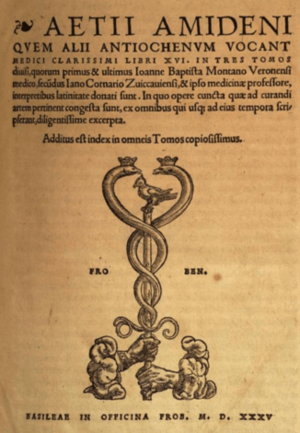Aëtius of Amida facts for kids
Aëtius of Amida was an important doctor and medical writer from the Byzantine Empire. He lived around the late 400s to early 500s. People knew him for his wide knowledge of medicine. He was likely a Christian, making him one of the first known Greek Christian doctors. Sometimes, people confuse him with another person named Aëtius of Antioch.
Aëtius's Life
Aëtius was born in a city called Amida. Today, this city is known as Diyarbakır in Turkey. He was a Greek by birth. He went to study medicine in Alexandria, which was the most famous medical school of his time.
His writings mention people who lived in the late 400s and early 500s. This helps us know when he was active. Another doctor, Alexander of Tralles, later quoted Aëtius's work. Alexander lived in the mid-500s.
Aëtius was a traveler too. He visited places like the copper mines in Soli, Cyprus. He also explored Jericho and the Dead Sea. In some old writings, Aëtius is called komēs opsikiou. This was a special title. It meant he was a chief officer who attended the emperor.
Aëtius's Medical Works
Aëtius wrote a major medical book. It was called Sixteen Books on Medicine. This book was not divided into four parts by Aëtius himself. Later translators did that.
His work is very valuable today. It brings together the knowledge of many older doctors. Many of these older works came from the famous Library of Alexandria. Sadly, most of those original works are now lost. Aëtius's book helps us know what was in them.
Aëtius was one of the first Greek Christian medical writers. He included some unusual remedies in his book. These included spells and charms that were popular in Egypt at the time. For example, he wrote about a charm for removing a bone stuck in the throat. He also mentioned one for a certain type of infection called a fistula.
Interestingly, in one part of his book, the word for "peak" or "climax" (akmē) was written slightly differently. It appeared as akne. This is believed to be the origin of our modern word, acne.
See also
 In Spanish: Aecio de Amida para niños
In Spanish: Aecio de Amida para niños
- Aetia gens
 | Tommie Smith |
 | Simone Manuel |
 | Shani Davis |
 | Simone Biles |
 | Alice Coachman |


